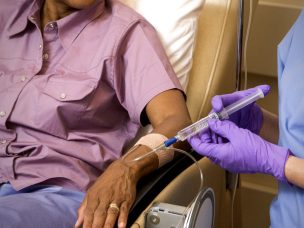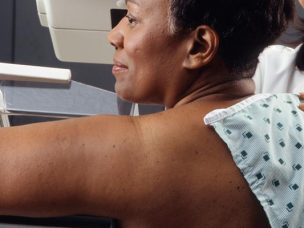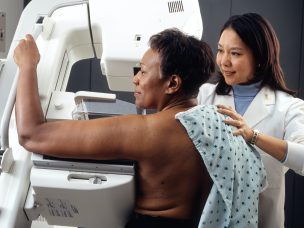SABCS 2020
Health Disparities and Breast Cancer Immune Microenvironments
A recent study led by Dr. Alina M. Hamilton at the University of North Carolina at Chapel Hill analyzed how breast cancer immune microenvironments differ by race and tumor subtype. Hamilton’s work recognizes the importance of the immune microenvironment in breast cancer survival. She sheds light on how this research could be of particular benefit...
Closing the Age Gap in Breast Cancer Clinical Trials
A recent study led by Dr. Mina S. Sedrak at City of Hope Comprehensive Cancer Center in Duarte, California, analyzed clinical and biological factors associated with physical resilience in senior women receiving chemotherapy for early breast cancer. Sedrak’s work recognizes that an older woman’s ability to maintain her daily level of activity is an important...
DNA Repair, Immune Response, Race, and Breast Cancer Disparities
A recent study led by Dr. Andrea Walens at the University of North Carolina at Chapel Hill analyzed how DNA repair, immune response and race are linked to breast cancer disparities, particularly in Black women. Walens’s work recognizes that the interplay of these factors is complex, and ultimately more research is needed to elucidate their...
Chronic Stress and Depression in Women With Invasive Breast Cancer
A recent study led by Dr. Jacqueline Kim at the University of California, Los Angeles, analyzed how chronic interpersonal stress and adverse childhood events affect rates of depression in women with invasive breast cancer. Specifically, Dr. Kim was interested in how these factors impact a woman’s rates of depression within a year of her breast...
Racial Disparities Persist in Digital Breast Tomosynthesis Breast Cancer Screening
A recent study led by Dr. Emily Ambinder at Johns Hopkins University analyzed how race in America affects breast cancer screening with digital breast tomosynthesis (DBT). Dr. Ambinder was interested in DBT for breast cancer screening, specifically, because DBT is superior to 2D full-field digital mammography (FFDM) in detecting breast cancer and requires less repeat...
Does African Descent Have a Different Genetic Profile Compared to European Ancestry?
There are disparities in the level of care and accessibility to care for people with African Ancestry (AA). A research study presented at the 2020 San Antonio Breast Cancer Symposium are finding a correlation between a patient’s ancestry and the biological drivers of breast cancer. Individuals with African Ancestry experience a disproportionally high rate of...
Fear of Doctors and Cancer Among Black Women May Play a Role In Racial Disparity In pCR After Neoadjuvant Chemotherapy
There is an increasing use of neoadjuvant chemotherapy in breast cancer patients; however, there is a need for a better understanding of the effectiveness on the tumor. Pathology plays a major role in finding how host factors interact with tumor characteristics. Patients expressing pathological complete response (pCR) is strongly correlated to long term survival in...
Responses to Heterogeneity and Resistance Continue to be Developed, with Increasingly Promising Results
Although the development of anti-HER2 treatments has come a long way, the likelihood of acquired resistance remains high. According to a study published in Therapeutic Advances in Medical Oncology, new treatment options and combinations can help to improve the ultimate outcome of a patient’s cancer treatment, as well as to de-escelate their treatment and reduce...
The HER2-Enriched Subtype May Be the Best Biomarker Avaialble for Prognosticating Therapeutic Response
HER2-positive breast cancer provides many distinct therapeutic challenges, and these can be simplified through a comprehensive understanding of the molecular subtypes characterizing different forms of heterogeneity that this cancer may exhibit. As heterogeneity is one of the leading sources of difficulty in treating HER2-positive breast cancer, understanding molecular subtyping can help create more informed novel...
More Medical News














